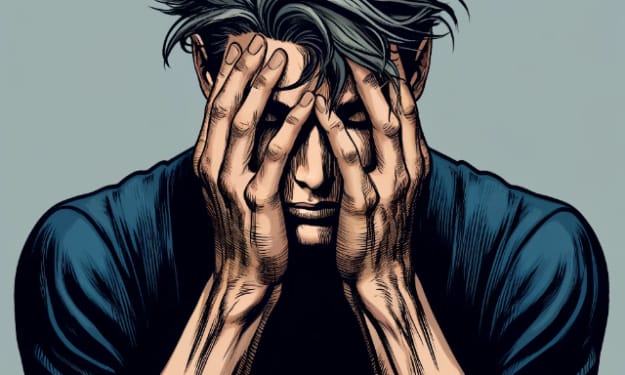Weariness & Exhaustion
A reflection on the behaviors that we reproduce automatically by pure inertia

Probably the most visible subjective symptom of quarantine has been weariness and boredom. It would be worth asking then to what extent "social relationships" sustain joy, enthusiasm and vitality so that in their absence , these collapse ostensibly, as if they had no other column or structure to survive on.
The point is that this world event caused the same problem in many people in a very short time, to the point that it could be said that one of the subjective effects of the pandemic would have been weariness and boredom.
But these large-scale diagnoses are always controversial, because they are still a sneaky way of crushing the subjective difference of each person in himself. The truth is that the pandemic has not only been a time of confinement, but also of discoveries for many people, who were already putting up with their lives by dint of propping them up with daily obligations and who, faced with the fall of these supports - with the quarantine - a fragility that was already there began to be revealed to them, that of their private affective and mental structures.
Today, without a pandemic, we can ask ourselves more clearly: how many rites, including going to work, support this type of fragility , in many cases little subjectivized, as underpinnings?
In search of the pillars of psychological well-being
Body caking may be sending messages about the lack of proper pivots to ensure that issues such as enthusiasm are constituted and also last over time. It is another kind of space that is in isolation when life is perceived flat and without depth , one that is not social, but is internal to each person himself. With the place of intimacy undone, the sensation of loss of depth is inescapable and the forced continuity (which only leaves exhaustion as a residue, the only way to continue) cannot be easily replaced by any hopeful imagery.
It may happen that certain irritations of the spirit sneak up on us. So stealthily that we can only reach them like thorns of the daily routine. We hardly tend then to look for its reasons, if they barely manifest themselves as a sensation, which although it is really annoying, it is also not very determined. This also results in the constant fatigue of someone who carries with them an unexplained and apparently inexplicable weight, and the automatism of a way of life accustomed to solving pending tasks and blindly driven by a single saving goal: rest ...

At every moment or untimely, the annoyance can present itself as the leaden background of the days, and that constant fatigue manifest itself in increase until it is disrupted in the voracious illusion that from the depths, is projected as the desire to do innumerable amount of things more happy.
If the more tired I am, the more things I dream of doing, it's time to draw the map of that nuisance or to review, at least, the inventory of life .
Who could really enjoy something if he doesn't first free himself from the ennui by which he is taken? What makes us think that in order to stop being exhausted we must take urgent vacations or sleep a little more? Is it that we assume that exhaustion is a place that one can leave and, therefore, enter?
Perhaps we will find some truth in that, especially if we subsume that place into a certain kind of reality that can be suspended at rest . And to get out, to be able to escape even for a while, the relief is immediate and feels as sweet as the true sensations of life. But then you have to go back... You have to go back there, where the intimate enemy lives.
Realities are sustained by various things, including ideas
The good thing is that an idea, among so many things, is also a way of changing. This is the reason why when the routine is filled with the same, it becomes increasingly difficult to see new ideas emerge, being almost impossible to imagine another reality. It would not be unusual for someone close to us to see us languish in such a way and ask us what is wrong, we hear ourselves say: I have not the slightest idea.
An idea is always a sign of transformation, a means, and constant fatigue, a fatal way of lasting . Because in the spirit nothing lasts in itself, everything is transitory, unless we insist on staying in some way, and many times, when we do not have the resources of a criterion that allows us to choose the way to last, we end up appealing to the general modes of despair that, although fateful, offer the simplicity of the durations that can consist without the need to anchor in the singular principles of joy and personal desire.
If we could isolate the conditions of permanent tiredness, we would surely be able to face it with something more powerful and lasting than the malnourished and constant need for rest . For this, it would be necessary to conceive that our fatigue provides the unsuspected gain of boredom, as a fact that allows us to remain, even if we are thus slaves to its domain. If we have seriously reached the dock of discontent, we must ask ourselves a question whose simplicity guarantees that we can bear it, and it is necessary to ask ourselves because in its atom it shelters the potential for any change: do I really want to stay like this?
A psychoanalysis always implies a precise way of intervening with all the tools that the word offers, in this sense the ideas correspond to a word state among other possible ones, since the word is not only what we use to speak, but also to write. , imagine, think, play or even create. This mode of speech that ideas are, are in their manifestation one among many elements that can cause events in people's lives, if these ideas find a way to consist and structure themselves, because without that weight ideas are carries the wind; And it goes without saying that when some exciting idea passed through us and then vanished, it always leaves the aftertaste of frustration, disability, or even the absence of courage .
But when an idea gains weight, it is capable of provoking an essential and vigorous instability, which is in itself the necessary condition for any change, because how could we change if we were not able to be moved/moved in some way?






Comments
There are no comments for this story
Be the first to respond and start the conversation.